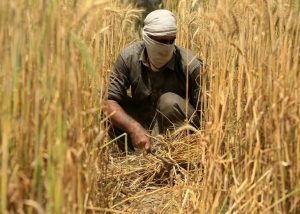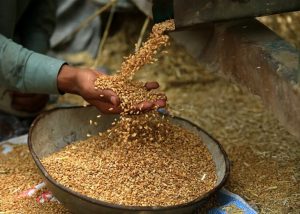Farmers blame their financial difficulties on current policies pertaining to wheat imports.

Pakistan’s Islamabad Tens of thousands of Pakistani farmers are protesting in multiple cities against the government’s decision not to purchase their wheat, which is resulting in significant financial losses for them.
The farmers of Punjab, Pakistan’s largest province and region known as the “bread basket,” are putting pressure on the government to halt the importation of wheat, which has flooded the market just when farmers are expecting bumper crops.
Using batons, police violently pushed back the farmers during a protest on Monday in the province capital of Lahore, and detained other farmers.
What set off the demonstrations?
The import of wheat during the second half of last year and the first three months of this year has infuriated the farmers, as it has led to an excess of wheat on the market and a decline in prices.
With agriculture accounting for roughly 23% of Pakistan’s GDP, it is one of the most important sources of income for the nation. Two percent is made up of wheat.a
There was a wheat scarcity in the first part of 2023 as a result of the disastrous floods that hit Pakistan in 2022 and affected wheat farming. Only 26.2 million tonnes of wheat were produced in 2022, despite Pakistan’s annual use of about 30 million tonnes. This led to price increases and long lines of people in cities trying to purchase wheat. There

A month before its term as government was to an end in July 2023, the ruling coalition of the Pakistan Democratic Movement (PDM) voted to permit the private sector to import wheat.
More than 3.5 million tons of wheat were imported into Pakistan from the foreign market between September 2023 and March 2024, when prices were significantly lower, according to data from the Ministry of National Food Security and Research.
Due to the surplus, Pakistan’s national and provincial food storage departments had more than 4.3 million tonnes of wheat in their stores at the beginning of April, when the country’s farmers began harvesting their wheat.
Typically, at a set price, the government buys roughly 20 percent of the wheat produced by nearby farmers (or about 5.6 million tonnes, assuming a production of 28 million tonnes in 2023). It claims that this market intervention preserves the supply chain, avoids hoarding, and assures price stability. Nevertheless, it has declared that it will only buy 2 million tonnes of wheat from Pakistani growers this year.
According to farmers, even if they produce the same amount of wheat as they did last year—indeed, they anticipate producing more—that still only makes up around 7% of the entire produce, leaving them out of pocket.
Farmers from Multan, Punjab’s Khalid Mehmood Khokhar, president of Pakistan Kissan Ittehad (PKI), said that last year’s decision to permit private importers to bring in an unlimited amount of wheat will force farmers to sell what they can to other sources at drastically reduced prices, which will result in significant losses.
We anticipate growing close to 32 million metric tonnes of wheat this year due to a big crop, but since the government already has plenty of wheat in its coffers, we
Why does the amount of wheat that the government purchases matter?
Adil Mansoor, a food security expert and researcher based in Karachi, claims that the price at which the remaining wheat grown by farmers is sold to flour millers and other market participants is determined in part by the government’s annual procurement of domestic wheat.
The rest of the market operates as intended since the government has established a reference price and sells things at it, he said, “when everyone knows that the single largest buyer [the government] will purchase the wheat at a certain price.”
How do the farmers put it?
Owning 4.8 hectares (12 acres) of property in Khanewal, Punjab, Ishfaq Jatt grows cotton and wheat. He claims that the high cost of fertilizer, water, and other necessities for growing wheat has caused a dramatic increase in the cost of producing wheat.
Jatt told Al Jazeera, “We farmers now have to sell the wheat to middlemen at a much-reduced rate, incurring losses for us.” “I own a tiny farm. I don’t have anywhere to keep the wheat I’ve planted. How am I going to use it? And how can I plant my next crop if I don’t get money from my harvest?
He continued by saying that if farmers believe they “cannot trust the government,” they may decide not to produce wheat in subsequent years.
What is said by the government?
Shehbaz Sharif, the prime minister, has mandated an inquiry into the wheat issue.
Punjab’s provincial minister of food, Bilal Yasin, stated earlier this week in the provincial assembly that the caretaker government, which took power in August of last year after the previous elected government’s term ended, was to blame for the issue. The need to reorganize seats in light of the most recent census caused the elections, which were scheduled to take place within three months, to be postponed. In the end, they took place in February of this year.
“The cause of this catastrophe is those who permitted the import of wheat near the time of wheat harvest. The minister stated, “But the government will still fully support the small farmers in spite of this.”
Al Jazeera made contact with


